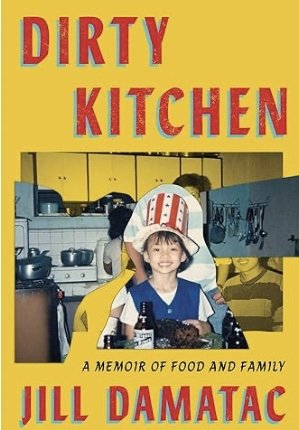Dirty Kitchen by Jill Damatac (Simon & Schuster) ~Janet Brown
By all standards, Jill Damatac’s parents were prime candidates for achieving the American Dream. Both had earned university degrees and were fluent in English. Both were from a country that had strong ties with the United States, who had dominated the Philippines for almost half a century. Filipino men who had fought with U.S. troops in World War Two were allowed legal immigration. Damatic’s parents were not.
Her father had been trained as an architect. Her mother had left a successful career as a banker in Manila. Neither are allowed entry on H-1B visas, which are given only to Filipinos who arrived as doctors, nurses, teachers, engineers, or domestic workers.
Entering the U.S. on tourist visas, the Damatac family swiftly fell into the category of illegal immigrants. When they applied for Social Security cards, only Jill’s mother benefited from a careless mistake. She receives a “clean” card that isn’t stamped with the words, “Not Valid for Employment.” Jill’s father erases that statement from the other three cards with skillfully transformed photocopies.
This gives him no advantage in the U.S job market, where he finds menial jobs in small grocery stores. Jill’s mother, after many unsuccessful interviews, eventually is hired as a management trainee at a bank and once again carves out a place for herself that befits her skills and experience.
Humiliated, her husband becomes violent and his daughter often bears bruises from his brutality. Finding that academic success alleviated his cruelty toward her, she excels. However her wage-earning potential is more important to her father and he forces her into the workplace. Years later, as an adult working the sort of dead-end jobs that are available to those without college diplomas, she finds that he has used her Social Security number to open credit cards in her name and has plunged her into insurmountable debt.
In one of those stranger-than-fiction moments, Damatac falls in love with a man from England and her life changes forever.
She is, she asserts, a woman with three countries: “a country of birth, a country of death, and a country of rebirth.” “I wrote this book to document myself into existence,” after growing up in America, who persistently refused to allow her existence.
Damatac vividly and terribly explores the hellish lives of undocumented immigrants in the U.S. But threaded through this is her inheritance given to her by the Philippines. When she left at the age of nine, her grandfather gave her three komik books filled with mythic gods and goddesses from her native country. When she arrives, she is accompanied by the memories of the food that has nourished her, the flavors that her mother and aunts do their best to recreate in America.
Throughout her account of cruelty and deprivation, a girl assailed by beatings and sexual assaults never loses sight of the heritage that is hers. Linking her life to the myths of her homeland and learning how to make the food that is her country’s legacy, Jill Damatac places the “dirty kitchens” of the Philippines with their fresh, flavorful ingredients and their outdoor settings against the gleaming sterility of refrigerators and microwaves that characterize American kitchens. These threads are what gave her the strength to discover “life, liberty, and the pursuit of happiness despite the United States.”
